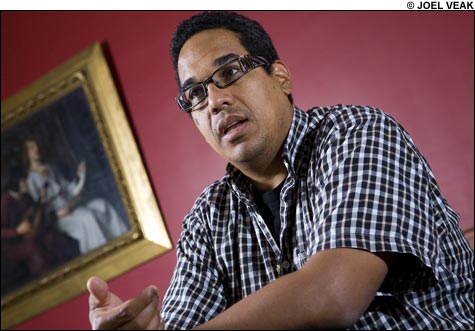
OPEN VISA: “I don’t want my music to have an immigration officer.” |
At 42, the pianist and composer Danilo Pérez is everywhere. For starters, he’s key to two of the best working bands in jazz right now, and two of the busiest: the Wayne Shorter Quartet and his own trio with bassist Ben Street and drummer Adam Cruz. (The latter perform this weekend at the Regattabar.) Besides that, he’s teaching at both Berklee College of Music and New England Conservatory. Since 2003, he’s run the Panama Jazz Festival, which is the keystone for his educational foundation and outreach programs in his home country. And this year he’s added two major works to his discography. In January came Panama Suite (ArtistShare), a recording of his own composition, and then on August 26 Across the Crystal Sea (Emarcy/Decca), a collaboration with the venerable composer/arranger Claus Ogerman.
Together these projects show the breadth of Pérez’s talent. Classically trained at the National Conservatory in Panama, he came to Berklee in 1985 to study jazz composition. His skill at combining the bebop vocabulary with his pan-American heritage was honed as a member of Dizzy Gillespie’s United Nation Orchestra, and a series of solo albums — especially 1996’s PanaMonk and 2000’s Motherland — showed him developing his own voice. But it wasn’t until he began playing with Shorter (on the 2003 Verve album Alegría) that his work leapt into a whole new dimension. When Shorter formed his new quartet, he pushed Pérez farther and farther out of his comfort zone. Pérez has always maintained that he wanted to play music “without an immigration officer”; Shorter, basing his new band’s music on a combination of his own compositions and free improvisation, stamped Pérez’s permanent visa. The Shorter Quartet’s live performances have become some of the most exciting on the scene right now because of their unpredictability and because the group (with bassist John Patitucci and drummer Brian Blade) have taken the jazz ethos of combining form and intuition to remarkable heights. It’s a practice that Pérez has continued in his own trio.

Of the new discs, Pérez told me when we got together at New England Conservatory during a break in his touring schedule with Shorter this past July, Panama Suite is his attempt “to translate the folkloric sound of Panama to the big-band setting but with the harmonies and adventure of jazz improvisation.” The three-movement, 25-minute work roils with catchy, riff-like tunes and propulsive Afro-Latin rhythms. Across the Crystal Sea, on the other hand, was conceived as an Ogerman project with producer Tommy LiPuma, and it wasn’t till the recording was completed that Ogerman decided Pérez should get top billing. “It’s all about him!” says Pérez affectionately of Ogerman. “I was just an actor in his movie.”
Ogerman and Shorter both have a taste for film metaphors, and despite very different careers, their æsthetic found common ground in Pérez. Much as Shorter has always been the independent artist, Ogerman has had a long career as an arranger-for-hire, with slews of Top 40 sides to his credit. When I reach Ogerman on the phone in LA, where he’s preparing to record with Diana Krall, he tells me of his days cranking out arrangements and asking his friend Nelson Riddle, “Do we have to do this until we’re tired? I wouldn’t want to die over an arrangement of ‘Blue Skies.’ ” But Ogerman’s work also extends to classical compositions and some of the most esteemed orchestral arrangements in jazz, from 1965’s Bill Evans Trio with Symphony Orchestra (the new album’s most obvious antecedent) to albums with Antonio Carlos Jobim, João Gilberto, George Benson, Michael Brecker, and Krall — her 2001 multi-platinum breakthrough The Look of Love.
For Across the Crystal Sea, Ogerman drew from sketches going back 20 years; these in turn drew on much of the music of his childhood, elaborating on themes from Falla, Massenet, Rachmaninov, and Sibelius, as well as a piece from the 20th-century German composer Hugo Distler. There’s also John Latouche & Jerome Moross’s “Lazy Afternoon” and Harold Rome’s “(All of a Sudden) My Heart Sings” (both sung by Cassandra Wilson), and the finale, Ogerman’s own “Another Autumn.”
Although Ogerman’s instrument is a pencil, Pérez found the music open — sometimes terrifyingly so. “He’d say, ‘The challenge is going to be that I didn’t think of anything for you to do, you have to make it up yourself.’ And I said, ‘Well, okay.’ He said, ‘The problem is, there are 100 bars of that.’ ”
“Yes,” says Ogerman. “It was a tour de force, and that was the first tune he recorded. I said, ‘Listen, this is the longest piece for you to play, the improvisation is very long, it goes through all 12 keys.’ But he’s great, he really nailed it down.”